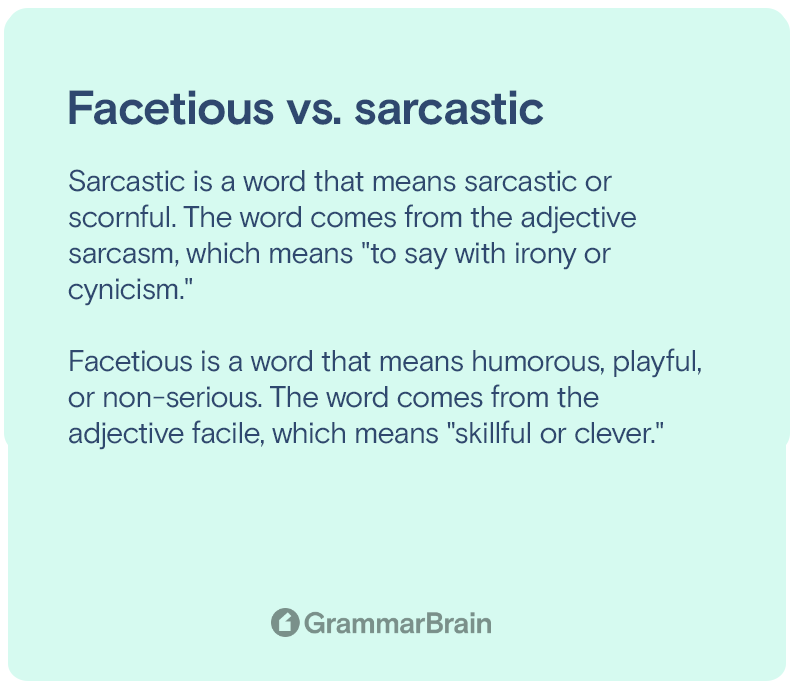What’s the difference between sarcastic and facetious? Sarcastic and facetious words are often used interchangeably but mean very different things. Let’s learn the difference between these two words and how they’re used in the English language.
Differences in definition between facetious and sarcastic
Sarcastic is a word that means sarcastic or scornful. The word comes from the adjective sarcasm, which means “to say with irony or cynicism.”
Facetious is a word that means humorous, playful, or non-serious. The word comes from the adjective facile, which means “skillful or clever.”
| Word | Definition |
| Facetious (adjective) /fəˈsēSHəs/ | treating serious issues with deliberately inappropriate humor; flippant. |
| Sarcasm (noun) /ˈsärˌkazəm/ | the use of irony to mock or convey contempt. |

Examples of use (and differences)
Sarcastic
Let’s look at some examples of sarcastic words and phrases:
- I love being on hold for an hour when I call the complaints department. I love the music on hold. I have always wanted to learn it by heart.
- Ms. Gibbs, noticing some children had left their empty trays on the table, remarked into the microphone, “Thank you for doing your best to keep our cafeteria clean.”
- When Tom asked Maria if she wanted to see his brand-new sports car, Maria said, “Sure! I’m so excited to see it! Send me 20 photos of your car taken from different angles!”
Facetious
When someone is being facetious, they try to sound smart or funny by making light of something serious.
- It can also mean that he is making jokes or comments that aren’t appropriate about something big or important. Take a look at the following examples:
- I don’t care whether I’m overweight. My cat is like sleeping on a couch where people sit.
- I heard that 43rd Street had been swamped for days. At least they no longer need to worry about not having enough water.
- Farah’s husband just left her. Now she has more room in her closet for her designer clothes.
Differences in assertion
The Greek term sarkazein, meaning “to talk severely,” is the source of our modern word “sarcastic.”In English, being sarcastic or using allusion means saying something ironic to hurt someone or show that you don’t like them.
On the other hand, the word “facetious” comes from the Latin word “facetus,” which means “witty.” To “dismiss a serious or significant topic with jokes or inappropriate humor,” as Merriam-Webster defines it.
Thesaurus website says that facetious is another word for tongue-in-cheek, mischievous, and funny. Facetious people deal with severe problems by making jokes or being careless.
In short, a sarcastic remark is ironic, hurtful, and snider, while a facetious statement is funny but not meant to hurt someone.
Main difference
The words “funny” and “sarcastic” describe two types of comments or statements that differ.
A facetious remark is a jokey remark about something serious that is meant to be funny. A sarcastic remark is a sharp, biting remark or taunts that shows disdain. This is what makes sarcastic different from being funny.
Word form and intention
Word Form
- Facetious is a form of the word facet.
- Sarcastic refers to the use of sarcasm.
Intention
- Facetious remarks are usually made in jest.
- Sarcastic remarks mock, belittle and insult.
Which word is best to use?
So, you might not want to use sarcasm to teach important life lessons regarding sarcasm vs. facetiousness. Instead, you might want to use facetiousness.
Being flippant can also be rude and insensitive, but it’s not as deliberate as being sarcastic.
If you use humor in everyday conversations with kids, you need to ensure they know how to use it, so they don’t hurt anyone, even accidentally.
Conclusion
Speech helps people get along. Imagine life without communication. People use phrases or words to communicate.
The comment or statement may have a clear meaning or an opposite sense. Some use puns and hyperbole. Sarcasm and irony are employed in some statements.
FAQs
What does sardonic mean and how is it different?
Sardonic means “grimly mocking or cynical.” It is similar to being facetious rather than sarcastic. Although, has a darker tone to the overall delivery.
Inside this article
Fact checked:
Content is rigorously reviewed by a team of qualified and experienced fact checkers. Fact checkers review articles for factual accuracy, relevance, and timeliness. Learn more.
Core lessons
Glossary
- Abstract Noun
- Accusative Case
- Anecdote
- Antonym
- Active Sentence
- Adverb
- Adjective
- Allegory
- Alliteration
- Adjective Clause
- Adjective Phrase
- Ampersand
- Anastrophe
- Adverbial Clause
- Appositive Phrase
- Clause
- Compound Adjective
- Complex Sentence
- Compound Words
- Compound Predicate
- Common Noun
- Comparative Adjective
- Comparative and Superlative
- Compound Noun
- Compound Subject
- Compound Sentence
- Copular Verb
- Collective Noun
- Colloquialism
- Conciseness
- Consonance
- Conditional
- Concrete Noun
- Conjunction
- Conjugation
- Conditional Sentence
- Comma Splice
- Correlative Conjunction
- Coordinating Conjunction
- Coordinate Adjective
- Cumulative Adjective
- Dative Case
- Determiner
- Declarative Sentence
- Declarative Statement
- Direct Object Pronoun
- Direct Object
- Diction
- Diphthong
- Dangling Modifier
- Demonstrative Pronoun
- Demonstrative Adjective
- Direct Characterization
- Definite Article
- Doublespeak
- False Dilemma Fallacy
- Future Perfect Progressive
- Future Simple
- Future Perfect Continuous
- Future Perfect
- First Conditional
- Irregular Adjective
- Irregular Verb
- Imperative Sentence
- Indefinite Article
- Intransitive Verb
- Introductory Phrase
- Indefinite Pronoun
- Indirect Characterization
- Interrogative Sentence
- Intensive Pronoun
- Inanimate Object
- Indefinite Tense
- Infinitive Phrase
- Interjection
- Intensifier
- Infinitive
- Indicative Mood
- Participle
- Parallelism
- Prepositional Phrase
- Past Simple Tense
- Past Continuous Tense
- Past Perfect Tense
- Past Progressive Tense
- Present Simple Tense
- Present Perfect Tense
- Personal Pronoun
- Personification
- Persuasive Writing
- Parallel Structure
- Phrasal Verb
- Predicate Adjective
- Predicate Nominative
- Phonetic Language
- Plural Noun
- Punctuation
- Punctuation Marks
- Preposition
- Preposition of Place
- Parts of Speech
- Possessive Adjective
- Possessive Determiner
- Possessive Case
- Possessive Noun
- Proper Adjective
- Proper Noun
- Present Participle
- Prefix
- Predicate



